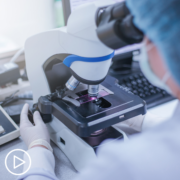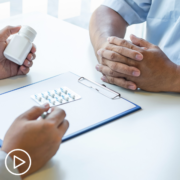Lung Cancer Initiative is the leading nonprofit in North Carolina that provides support to the lung cancer community by connecting patients, survivors, and loved ones with the medical and research community. Our mission is to advance survivorship and provide support to those affected by lung cancer through research, education and access programs.
Tag Archive for: Lung Cancer Research Foundation
Expert Advice for Patients With Small Cell Lung Cancer
Expert Advice for Patients With Small Cell Lung Cancer from Patient Empowerment Network on Vimeo.
Dr. Triparna Sen, a leading small cell lung cancer (SCLC) researcher and expert, shares key advice for patients. Dr. Sen stresses the importance of working closely with your doctor, asking about clinical trials options, and the benefits of support groups.
Dr. Triparna Sen is an associate professor in the department of oncological sciences and co-director of the Lung Cancer PDX Platform at the Icahn School of Medicine at Mount Sinai in New York. Learn more about Dr. Sen.
See More from Thrive Small Cell Lung Cancer
Related Resources:

|

Advances in Small Cell Lung Cancer Research | Hope for the Future |

|
Transcript:
Katherine:
What three key pieces of advice would you have for a patient who has just been diagnosed with small cell lung cancer?
Dr. Sen:
First of all, I would like to say definitely, definitely work with your physician. They are trying to do their best for you. Work with your physician. Follow the treatment regimen that they give. Ask about clinical trials that you are eligible for and that you can enroll into. Then, of course, having a support group. So, there are many patient advocacy groups right now for non-small cell and small cell lung cancer.
I think being a part of such a patient advocacy group where you have people going through the same journey, I think, it really helps. It helps you sort of manage your disease better. It helps you stay hopeful when you hear about other people’s sort of prognosis and if they have durable benefits from drugs. So, I think having a support group is very important. If there is an ability for you to contribute to research in terms of giving blood or tissues, if your physician is saying that you could be eligible for that, I think a contribution to research is really key.
Because looking at the disease mechanisms in the clinical tissue is sort of where for us it is absolutely golden. We go there. We look at the disease mechanisms and tissues. If there is an opportunity for you, then I think it should definitely be explored.
Finally, I would like to say we are really trying as researchers to really understand the disease better. We’re trying to do that better. I hope and I pray that we go faster with it. But I think there is hope right now for patients with small cell lung cancer. The research is really progressing better. There are many clinical trials.
So, I think stay hopeful and have a peer support group who can take you through this quite difficult journey.
Katherine:
Why should patients consider consulting with a lung cancer specialist?
Dr. Sen:
I think it’s crucial because these lung cancer specialists really know the current state of the art treatments. They are thought leaders. They participate in trials. They actually sit on advisory boards with companies.
They are strategizing the entire treatment landscape for this disease. So, if you go to a lung cancer specialist, you’re more likely to get the most updated knowledge about what treatments are out there, what you qualify for, what are the clinical trials out there, and what are working in patients. This is not just for small cell. There are many, many trials that are happening in non-small cell also. So, whatever your diagnosis is, a specialist should be able to tell you what your options are. You really want to know about your options. Your options about biomarker testing.
Your options about screening. Your options about trials. I think a lung cancer specialist can really guide you towards that.
Katherine:
Dr. Sen, thank you so much for joining us today. It’s been a pleasure speaking with you.
Dr. Sen:
Thank you.
Jasper
Jasper is a digital app for your cancer care. Organize your schedule, track your medications and symptoms, and access cancer care coaching support—all in one place. Jasper is available both via web and mobile app. To sign up and learn more visit http://www.hellojasper.com/members
After Breast Cancer Diagnosis (ABCD)
Founded and grounded in Milwaukee in 1999, ABCD is an international breast cancer organization that provides free, customized, one-to-one emotional support to empower anyone impacted by a breast cancer diagnosis —patients, family, and friends. Working as a complement to medical care, all of our support services are delivered virtually over the phone or online, making them available anywhere it the world.
Their signature service is creating a unique match between a breast cancer patient and a professionally trained volunteer Mentor/breast cancer survivor or thriver who not only share a similar diagnosis and treatment plan, but also have common interests, similar ages, personal traits, and family dynamics. They support all stages and diagnoses, including metastatic/Stage IV. They currently have 200 active and diverse Mentors located throughout the United States, enabling them to make truly personalized connections.
American Urological Association
Founded in 1902, the American Urological Association (AUA) is a premier urologic association, providing invaluable support to the urologic community. Our mission is to promote the highest standards of urological clinical care through education, research and the formulation of health care policy.
Association of Community Cancer Centers: ACCC
Association of Community Cancer Centers: ACCC
The Association of Community Cancer Centers (ACCC) is a powerful community of more than 28,000 multidisciplinary practitioners and 2,100 cancer programs and practices nationwide.
Founded in 1974, ACCC brings together healthcare professionals across all disciplines in oncology to promote quality cancer care. It is estimated that 65 percent of the nation’s cancer patients are treated by a member of ACCC.
Members rely on ACCC for education and advocacy support in adapting and responding to complex changes and challenges in the delivery of quality cancer care. ACCC provides resources on operations and management for programs and practices, reimbursement issues, policy and regulatory changes at the state and national levels, trends in cancer care, integrating new technologies and therapies, and more.
Leukemia Research Foundation
Mission
The Leukemia Research Foundation’s mission is to cure leukemia by funding innovative research, and to support patients and families. With more than $83M raised in support of this mission, we are on the path to finding a cure – and won’t stop until we do.
Lung Cancer Research Foundation
Mission
The mission of the Lung Cancer Research Foundation (LCRF) is to improve lung cancer outcomes by funding research for the prevention, diagnosis, treatment and cure of lung cancer.
Vision
Our vision is a world free of lung cancer.
History
We can accomplish more together than one of us can alone. That’s why LCRF has merged with like-minded organizations over the years. Here’s our history at a glance:
Lymphoma Research Foundation
The Lymphoma Research Foundation (LRF) is the nation’s largest lymphoma-focused health organization devoted to improving care through education and support services and improving outcomes through investment in the most promising lymphoma research. LRF’s mission is to eradicate lymphoma and serve all those impacted by this blood cancer.



